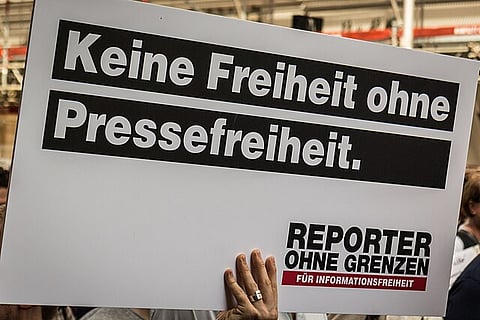

The International Press Institute (IPI) has issued a forceful call to action, demanding that states and world leaders demonstrate the political will to end the global crisis of impunity for crimes against journalists, warning that the lack of accountability is empowering authoritarianism and weakening democratic freedoms worldwide.
This call was formalized in a resolution unanimously adopted by IPI members on October 15, 2025, during the organization's 74th annual General Assembly and presented at the IPI World Congress in Vienna . The resolution states that impunity for crimes against journalists persists despite binding international commitments by states to ensure accountability . This failure to uphold the rule of law represents a "global breakdown" of norms designed to protect press freedom . The IPI stressed that this entrenched impunity erodes the rule of law and fuels further violence, sending a chilling message that journalists can be harassed, silenced, or killed without consequence .
The resolution singles out several regions where the crisis is particularly severe. It notes that the situation is most evident in Gaza, where at least 235 journalists have been killed by Israeli forces since the start of the war two years ago, without a single case being credibly and independently investigated . This makes Gaza the deadliest conflict for journalists on record . Beyond Gaza, journalists face near-total impunity for killings, intimidation, and kidnappings in Haiti, Sudan, and Mexico . In Mexico, journalists covering corruption and crime are routinely murdered, making it one of the deadliest countries for the press outside of active war zones.
The resolution on impunity was one of several adopted by the IPI General Assembly that collectively defend the role of a free press. In another resolution, the IPI underscored that independent media is a cornerstone of free societies and a vital check on the concentration of power . The institute warned that journalists and media outlets worldwide face escalating threats, including legal harassment, censorship, surveillance, and coordinated smear campaigns designed to discredit professional journalism and erode public trust . This sentiment was echoed by UN Secretary-General António Guterres, who stated that "when the press is silenced, everyone loses their voice," and emphasized that impunity is an assault on press freedom and a threat to democracy itself .
Recognizing modern challenges, the IPI also adopted a resolution reaffirming the value of "human-made journalism" in the age of artificial intelligence . It urged policymakers and technology companies to safeguard the future of human-centered reporting, emphasizing that responsible innovation must not replace the essential human role in news production . The IPI warned that AI-driven algorithms, controlled by a few tech companies, can prioritize divisive content and be misused to spread disinformation, create deepfakes, and harass journalists, trends that undermine public trust and corrode democratic debate .
The IPI's resolutions serve as a comprehensive call to action, insisting that laws and international agreements alone are insufficient. They conclude that what is urgently required is genuine political will from states and world leaders to investigate, prosecute, and punish crimes against journalists, thereby defending the bedrock principles of a free society and a free world .